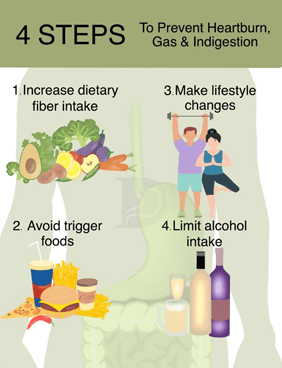Peptic ulcers are sores that develop inside the stomach lining and in the upper portion of the small intestine. Stomach pain is the most common symptom of peptic ulcers.1
Types of Peptic Ulcers
Peptic ulcers are of three types:
Gastric ulcer: Most common type, occurs inside the stomach lining
Duodenal ulcer: Occurs inside the upper lining of the duodenum
Esophageal ulcer: Develops in the esophagus
Anatomy and Function of the Stomach
The stomach produces hydrochloric acid, which helps digest food before it reaches the small intestine for absorption. A mucous lining inside the stomach protects the stomach from the acid.
Causes of Peptic Ulcers
The following causes may lead to peptic ulcers2:
- Helicobacter pylori bacterial infection
- Medications like aspirin, ibuprofen (Advil), Feldene, Naprosyn, Voltaren, Indocin, Aleve, Lodine, etc.
- Smoking
- Alcohol consumption
- Radiation therapy
Helicobacter pylori
Helicobacter pylori bacteria are the most common cause of gastric ulcers.3 H. pylori bacteria have a twisted spiral shape that adheres to the stomach's mucous lining. This adherence to the stomach wall leads to inflammation in the stomach's lining; this inflammation is called gastritis. The protective mucous layer is damaged, leaving the stomach prone to damage from hydrochloric acid.
Symptoms of Peptic Ulcer
Symptoms may vary depending upon the number and severity of ulcerous sores. The most common symptom is a burning sensation in the abdomen and chest area. Symptoms will appear after meals and while sleeping. The following symptoms are commonly observed with peptic ulcers:
- Nausea
- Change in appetite
- Unexplained weight loss
- Dark stool
- Indigestion
- Chest pain
- Vomiting
Diagnosis
Severity and range of symptoms and patient history help diagnose peptic ulcers. However, confirmatory diagnosis requires some tests. The following tests are regularly performed4:
Upper endoscopy
In this procedure, the doctor passes a long tube with a camera attached to it to examine the internal structure of the stomach and look for ulcers. This procedure also allows tissue sampling for microscopic examination. It is recommended when there is a risk of stomach cancer.
Upper GI
The doctor may suggest an upper GI test if you don't have stomach cancer. Barium liquid is ingested, and an X-ray of the stomach, esophagus, and intestines is taken. Liquid barium enhances the contrast and helps provide a better stomach image for the physician.

Treatment
Various medications like proton pump inhibitors (PPIs) are available, which limit stomach acid production.5 Acid-suppressing drugs are also effective in lessening the symptoms.
- No further treatment is required if the ulcer is caused by aspirin or arthritis medications. Avoiding the drug will allow the peptic ulcers to heal over time.
- Antibiotics are the best choice if the peptic ulcer is associated with H. pylori bacteria. Antibiotics will kill the bacteria and prevent the reoccurrence of peptic ulcers.
- A physician may prescribe sucralfate, which coats the stomach's inner lining to protect it from acidic gastric juice.
Prevention
Apart from medication, the following measures help prevent and lessen the symptoms:
- Avoid caffeine and alcohol
- Quit smoking, as it delays the healing process
- Use OTC antacids
- Avoid stress, which aggravates stomach ulcers.
Surgery
Surgery is the last resort if medications are not showing results and the condition is severe. Surgery is recommended for patients with obstructions or perforations.

References
- Stern E, Sugumar K, Journey JD. Peptic Ulcer Perforated. StatPearls. Published online June 21, 2022. Accessed August 9, 2022. https://www.ncbi.nlm.nih.gov/books/NBK538326/
- Malik TF, Gnanapandithan K, Singh K. Peptic Ulcer Disease. Mayo Clin Gastroenterol Hepatol Board Rev. Published online June 11, 2022:49-56. doi:10.1201/b16120-13
- Parikh NS, Ahlawat R. Helicobacter Pylori. StatPearls. Published online August 11, 2021. Accessed May 24, 2022. https://www.ncbi.nlm.nih.gov/books/NBK534233/
- Woolf A, Rehman RB, Rose R. Gastric Ulcer. StatPearls. Published online April 19, 2022. Accessed August 9, 2022. https://www.ncbi.nlm.nih.gov/books/NBK537128/
- Ekström P, Carling L, Wetterhus S, et al. Prevention of peptic ulcer and dyspeptic symptoms with omeprazole in patients receiving continuous non-steroidal anti-inflammatory drug therapy. A Nordic multicentre study. Scand J Gastroenterol. 1996;31(8):753-758. doi:10.3109/00365529609010347

